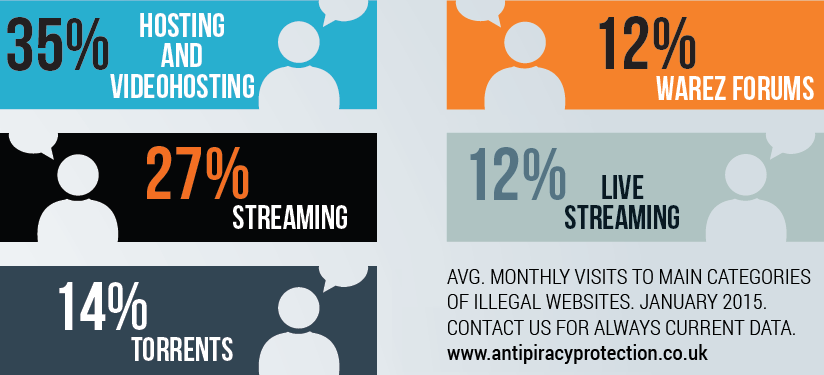Internet Piracy: Know Your Enemy

Torrents continuously decrease in popularity while users embrace new, easier ways to access copyrighted content.
What are we facing?
Comparing torrents with video-streaming is like comparing the ease of Netflix with having to go to a video store on a cold and rainy day, queue there, and often not even find what you were looking for. It isn’t surprising that torrents are becoming a relic of the past whilst other ways of accessing pirated material are attracting rapidly growing interest.
For years, torrents have been a hot topic among governments and lawmakers. People have now realised the numerous down sides of using them. Contrary to other means of accessing infringing material, your IP number can be easily detected by the authorities. In some jurisdictions such as Germany, it is then shared with law firms representing copyright owners, who will sue users for illegal distribution of pirated material as while downloading a file they are at the same time sharing it with others (hence the term ‘peer2peer’).
However, policy makers and lobbyists overlooked that torrents have in fact been marginalised over the past years. They have been replaced by new mediums of access and distribution such as video-streaming and cloud-based sharing websites. Those mediums are not only easier to use but also safer from a legal perspective as the user only downloads or streams the material without sharing it with others.
The amount of such infringing websites is growing rapidly with the increasing demand. APP Global currently monitors over 6400 individual piracy websites worldwide. There are multiple business models in place to generate revenue and increase traffic. Such sites sell ads and premium membership plans, as well as share their revenue with the uploaders via affiliate programs, to get new material and to promote their site across the Internet.
Surely someone must be monitoring those websites, right?
You may find it hard to believe but the legislation leaves it to content owners. Under so-called Safe Harbour provisions, a principle on which international IP laws are based, the owner of a hosting or streaming website is not liable for copyright infringement until notified. Even if he hosts and distributes millions of hours of illegal material uploaded by users, he doesn’t have to remove it unless requested by the rights owner or his representative.
Sounds like the Wild West and in need of immediate change, doesn’t it? Well, changes are underway… but for the worse. Lawmakers and lobbyists, especially in the EU, steer towards loosening responsibilities of internet companies and immunising users, all in the name of ‘internet freedom’ and ‘digital privacy’.
How do you keep track of thousands of piracy websites and millions of links?
You know now that it is your responsibility to protect what you own. However, taking care of such a widespread phenomenon may require employing cohorts of people, making the game not worth the candle. Indeed, trying to manually monitor and enforce links, uploads and streams is not only costly but also next to impossible.
Luckily there are solutions that leverage Internet technology against piracy. Instead of funding an internal team, you can outsource the work to the experts. Using an industrial-scale anti-piracy solution you’ll have the whole Internet monitored for illegal instances of your material day and night, that once found, will trigger enforcement actions. Apart from making the process quicker and much more effective, the software solution also addresses issues such as filtering out false positives and producing invaluable reports as to where and how is your content received around the globe.
Start getting to grips with your enemy
Begin with researching your most valuable titles across various piracy websites in the Internet. Just type the name in the search engine adding phrases ‘for free’, ‘watch online’, ‘download’ and so forth. If you start feeling worried, contact us for a free consultation and detailed analysis. Having a clear big picture is the first step towards addressing the threats imposed by Internet piracy.
